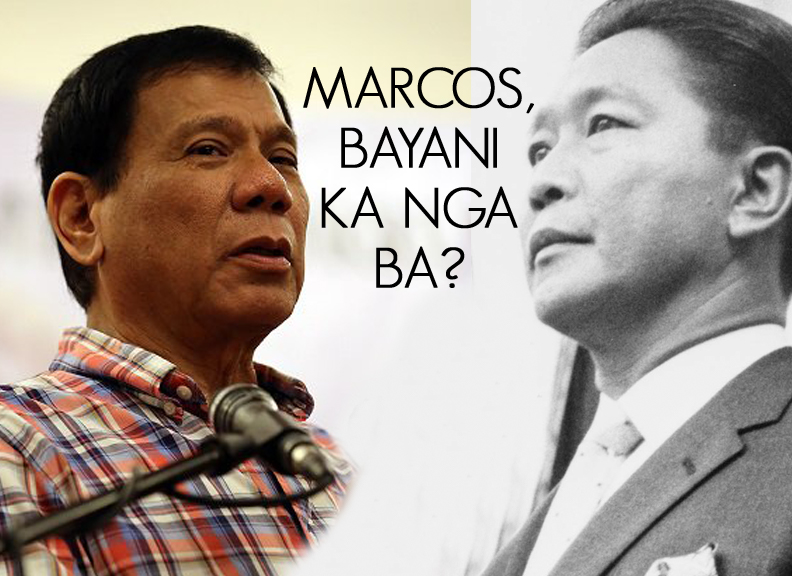Ilang taon na ang nakakalipas nang ang Pilipinas ay dumaan sa matinding Martial Law sa ilalim ng pamumuno ng dating pangulong si Ferdinand Marcos. Maraming tao ang namatay, naghirap at nasaktan. Ngunit isang malaking pangyayari ang dumating ngayon sa pamumuno ni Pangulong Rodrigo Duterte. Ito ay nang inanunsyo niya na ililipat daw ang bangkay ni Marcos sa libingan ng mga bayani. Pero ano nga bang reaksyon ng mga tao ukol dito sa isyu na ito?
Maraming mamamayan ang nagalit at nagtaka sa desisyon ni Pangulong Duterte sa kanyang pamumuno na ika’y ilibing nga si Marcos sa libingan ng mga bayani at marami din ang sumangayon rito. Sinasabi ng mga di sangayon na bakit raw kailangan ilibing si Marcos sa libingan ng mga bayani gayong pagpapahiram lamang ang dinulot niya sa lipunan. Sinasabi rin naman ng mga sangayon ay hindi naman naging masama si Marcos sa panahon niya, ginawa lamang niya ang nararapat. Ika nga “Parang nanay mo lang yan, lalagyanan ng ice cream pero tilapia ang laman”. Pero tignan muna natin kung ano nga bang maayos at magulong pangyayari noong panahon niya.
Nakakalap ako ng impormasyon mula sa isang mamamayan na nakaranas ng Martial Law. Heto ang sinabi niya.
“The real pros and cons regarding the Marcos dictatorship are best discussed and debated by those who lived through those years, either as spectators or as protagonists. Those who have no idea what it was because they weren’t born yet, or too young to understand what it was then, are better off listening, reading, learning and weighing the information.
As one who lived through Marcos’ reign, from 1965-1983, when I was 17 until 38 years of age when he departed from the scene, I can say that in those 21 years of his rule the country slid from the second best economy in Asia to Asia’s sick man. By the time he was booted out by the middle class, the country was suffering from 3 potent insurgencies waged by Muslim secessionists, Communist guerrillas and Military rebels. Philippine foreign debt was overburdening the economy and eroding our capacity to pay it back.
The exodus of unemployed began to increase steadily during his time; labor unrest in the urban and rural areas were at a boiling point; protesters, young and old, were being arrested and maltreated forcing many of them to go underground to join the rebel movements. Disappearances and stories of torture became the new normal. Anyone could be arrested without a warrant on mere suspicion or whim.
When Ninoy Aquino was murdered upon his return, the economy sank to its knees and interest rates rose to over 50%. The peso depreciated steeply several times; political patronage in the form of logging concessions denuded our forests; in the form of smuggling sank our revenue collections; in the form of crony capitalism, snatched lucrative businesses away from political opponents and the old oligarchs only to transfer the wealth to their own circles. The coffers were bled dry; bribes and extortion were hitting the roof.
Impartial historians and academic circles in the world’s capitals of learning have painstakingly chronicled the record of the Marcos dictatorship, and it is as ugly as they come from the likes of the Ceaucescu, Duvalier and Pinochet eras to name a few, possibly even worse. What is firmly etched in the pages of scholarly papers on how the Philippines fared during his era must be the subject of public education and discourse.
Our uninformed need to be taught how to read, research and comprehend because they are part of the country’s social fabric and the Philippines can ill afford historical revisionism from those who were part of that abusive era and have not, to this day, apologized to the people nor undertook any form of just restitution for their past sins to society and to the damage they wrought to the country’s institutions.
We must learn from that horrible mistake otherwise we will inevitably repeat history. So help us God!” – Rafael Alulan III
Sa aking pananaw, masasabi kong nararapat lang ilibing si Marcos sa libingan ng mga bayani. Naniniwala ako na ang ginawa niya ay naging strikto lang sa mga mamamayan ng Pilipinas pero wala siyang intensyon na magpasakit. Gaya ng magulang natin, kung gusto nila na matuto tayo at tumayo sa sarili nating mga paa ay sasanayin nila tayo sa hirap kaysa ginhawa. Masyado nang nasanay ang mga Pilipino na ginhawa nalang ang iniisip at nabulag sa katotohanan na ang pakay ni Marcos ay turuan tayo na maging matatag at tumino.
Para sakin, bayani si Marcos.
